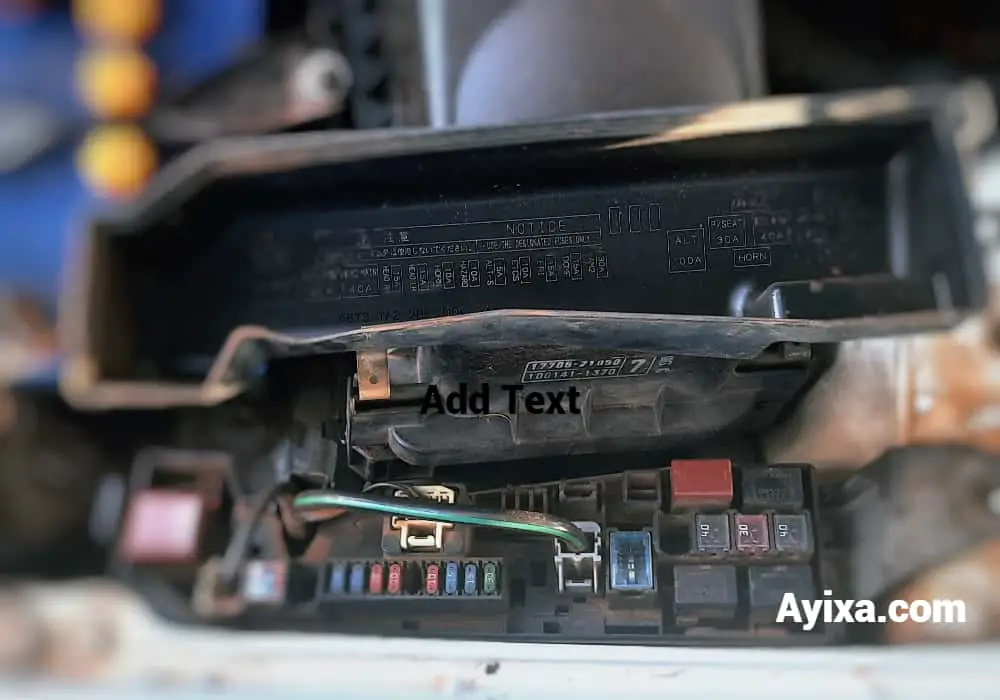An alternator fuse is usually rated several hundred amps and should it blow, then you have an issue of extremely large currents flowing that can damage wiring and potentially cause a fire!
Do not hesitate to contact a qualified mechanic as this is an issue of serious concern that requires immediate attention.
If you’re looking for suggestions on what may be causing the fuse to blow, what signs show, and how to fix it then read on.
Why an Alternator Fuse Blows
The car alternator fuse may blow because:
1. The alternator output has been short-circuited
If there’s an accidental short of the alternator output voltage with the ground connection then the alternator fuse or fusible link will blow.
Inspect the cable connected to the B+ terminal of the alternator along its length for any signs of cable damage or exposed cables that may be shorting. Replace the damaged cable.
2. Reversing the battery connections
Accidentally reversing the battery connections, such as when connecting the battery terminals to a new battery can also short out the alternator fuse.
The positive battery cable should be connected to the terminal of the battery with a “+” sign and the negative to the terminal with a “-” sign.
As simple as it seems, it is possible to make a mistake if in a hurry or when tired.
Alternator Fuse Keeps Blowing? Possible Reasons
If the alternator fuse or fusible link keeps blowing, it’s because the underlying fault that’s causing the overload has not been identified and fixed.
Could there be a section of cable that’s out of sight and shorting? Carefully inspect the length of the cable looking for signs of damage or burn marks.
Car Alternator Fuse Location
To locate the alternator fuse, trace the power cable running from the alternator. Along its length, you should find a mounted box on the car’s chassis where the fuse is installed. Its location can vary from one car to another.
In some cars, the fuse may be in the fuse box near the battery. Check the layout of the fuses that are usually shown on the inside of the fuse box.
Alternator fuse symbol
The symbol that’s usually used is ALT, short for the alternator. Refer to the car service manual for your model to locate it.
It is a high amperage fuse, inline usually several hundred amps that through which power from the alternator flows to all the other car subcircuits and the battery.
Signs that an Alternator Fuse Has Blown
Note: The signs below are not confirmation that the alternator fuse has blown. While they can point to a fuse blow, Additional tests need to be done.
If the car alternator fuse or fusible link has blown, you may be able to tell from:
1. Battery light on the dashboard on
If the alternator fuse is blown then the light will come on, a sign that there’s a problem with the car’s electrical system.
Now, this can be attributed to several causes including loose battery or alternator connections, or even faulty alternator.
A blown alternator fuse is one of them.
2. Alternator not charging the battery
Additionally, the car battery will not charge. The car may stall or the battery may appear to drain faster than usual because the alternator is not replenishing the charge of the battery.
If the battery and alternator tests confirm that either is still in good condition yet the alternator fails to charge the battery even though the wire connections are clean, and firmly connected then you should rule out the possibility that the alternator fuse has blown.
What happens when the alternator fuse blows
Put another way, when the alternator fuse or fusible link blows, the car battery will not be charged and will drain flat and the car dashboard light will remain lit too.
How to Check if the Alternator Fuse has Blown
To confirm whether an alternator fuse has blown or not, you can use a digital multimeter set to measure resistance. Locate the alternator fuse.
Remove it from the mounting. Place the meter probes on either side of the fuse or fusible link and take the resistance reading.
If intact, the resistance should read zero ohms. An open circuit reading assuming the meter is set right and the probes are making good contact to either end of the fuse or fusible link shows a blown fuse.
Tips to Avoid Blowing the Alternator Fuse
1. Avoid accidental grounding of the car alternator output
Take care when connecting or disconnecting battery cables or other electrical connections. Grounding the alternator output will blow the alternator fuse.
2. Do not reverse the car battery terminals
Additionally, take care when connecting battery cables to connect the battery positive terminal to the battery positive post and the negative terminal to the negative battery post.
Reversing the polarity of the cable connections can damage the alternator output.
Related Topics
Will a Car Start with a Blown Alternator Fuse?
Yes, a car can start with a blown alternator fuse provided the battery has sufficient charge. This is because, for a car to start successfully, only the battery needs to have sufficient charge. The alternator can be faulty.
A working alternator is necessary to keep the battery charged as power is drawn by the car accessories. As soon as the battery is drained the car engine will stall!
Closing Thoughts
The alternator fuse or fusible link will blow if there’s a short or overload on the fuse from the alternator.
This can happen when the battery cables are accidentally reversed or in case the alternator output is shorted.
Do not hesitate to contact a qualified mechanic for assistance.
Related Topics

